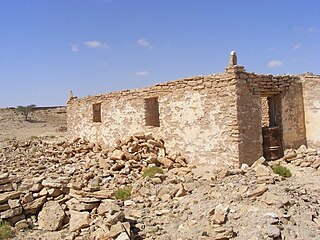
Xenophobia is the fear or dislike of anything which is perceived as being foreign or strange. It is an expression which is based on the perception that a conflict exists between an in-group and an out-group and it may manifest itself in suspicion of one group's activities by members of the other group, a desire to eliminate the presence of the group which is the target of suspicion, and fear of losing a national, ethnic, or racial identity.

The Hawiye is the largest Somali clan family. Members of this clan traditionally inhabit central and southern Somalia, Somaliland, Djibouti, Ethiopia and Kenya. They are also the majority in the capital city, Mogadishu.

Harti, meaning "strong man", is a Somali clan family that is the part of the Darod clan. The major sub-clans include the Majeerteen, Warsangeli, Dishiishe, Dhulbahante and while other minor sub-clans consist of Kaskiqabe, Geesaguule and Liibaangashe.

The Islamic Courts Union was a legal and political organization founded by Mogadishu-based Sharia courts during the early 2000s to combat the lawlessness stemming from the Somali Civil War. By mid-to-late 2006, the Islamic Courts had expanded their influence to become the de facto government of most of southern Somalia.

The 2006 Islamic Courts Union offensive is the period in the Somali Civil War that began in May 2006 with the Islamic Courts Union's (ICU) conquest of Mogadishu from the Alliance for the Restoration of Peace and Counter-Terrorism (ARPCT) and continued with further ICU expansion in the country. Following the outbreak of the war on December 21, 2006; by December 24, direct Ethiopian intervention in the conflict in support of the Transitional Federal Government (TFG) was no longer denied by the Ethiopian government. The Eritrean government denied any involvement despite Ethiopian claims to the contrary.
Following the civil war and the ensuing societal chaos, some factions managed to exert a degree of authority over certain regions of Somalia where they maintained broad, clan-based support. This allowed these factions to establish working administrations and eventually coherent states, and restored order to their regions. This occurred first in Puntland, Southwestern Somalia, Galmudug, Jubaland and finally Banadir.
Ethnic hatred, inter-ethnic hatred, racial hatred, or ethnic tension refers to notions and acts of prejudice and hostility towards an ethnic group to varying degrees.
This is a list of topics related to racism:
The timeline of events in the War in Somalia during 2006 is set out below.
Prior to 1994, immigrants from elsewhere faced discrimination and even violence in South Africa due competition for scarce economic opportunities. After majority rule in 1994, contrary to expectations, the incidence of xenophobia increased. In 2008, at least 62 people were killed in the xenophobic uprising and attacks. In 2015, another nationwide spike in xenophobic attacks against immigrants in general prompted a number of foreign governments to begin repatriating their citizens. A Pew Research poll conducted in 2018 showed that 62% of South Africans expressed negative sentiment about foreign nationals living and working in South Africa, believing that immigrants are a burden on society by taking jobs and social benefits and that 61% of South Africans thought that immigrants were more responsible for crime than other groups. There is no factual evidence to substantiate the notion that immigrants are the main culprits of criminal activity in South Africa, even though the claim is incorrectly made in sometimes by politicians and public figures. Between 2010 and 2017 the number of foreigners living in South Africa increased from 2 million people to 4 million people. The proportion of South Africa's total population that is foreign born increased from 2.8% in 2005 to 7% in 2019, according to the United Nations International Organization for Migration, South Africa is the largest recipient of immigrants on the African continent.

The Somali civil war (2009–present) is the ongoing phase of the Somali civil war which is concentrated in southern and central Somalia. It began in late January 2009 with the present conflict mainly between the forces of the Federal Government of Somalia assisted by African Union peacekeeping troops and al-Qaeda-aligned al-Shabaab militants.
Somalis are an ethnic group in the Minneapolis–Saint Paul metropolitan area that makes up the largest Somali diasporas in the United States. By 2018, approximately 43,000 people born in Somalia were living in Minnesota, and approximately 94,000 Minnesotans spoke Somali language at home.

Mohamud Noor is an American politician serving in the Minnesota House of Representatives since 2019. A member of the Democratic–Farmer–Labor Party (DFL), Noor represents District 60B, which includes parts of the city of Minneapolis in Hennepin County.

This is a 2015 timeline of events in the Somali Civil War (2009–present).
The 2016 Minneapolis shooting took place on June 29, 2016, in Minneapolis, Minnesota when a man named Anthony Sawina shot at five Somali-Americans, wounding two of them. Witnesses later recounted that Sawina shouted anti-Muslim expletives and claimed he was "going to kill [them] all." The attack was condemned by civil rights groups as part of a larger rise of Islamophobia in the United States leading up the 2016 presidential election.

This is a 2016 timeline of events in the Somali Civil War (2009–present).
Events of 2020 in Somaliland.
Events in the year 2020 in Somalia.








